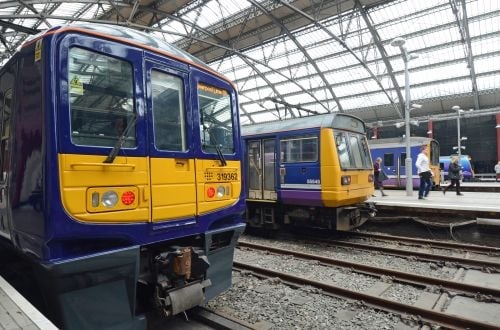Arriva Rail North will take over the Northern franchise from Northern Rail, a 50:50 joint venture between Abellio and Serco, in April 2016 under a contract which runs until March 2025. £400m will be invested in 98 new 160km/h trains (281 vehicles), including DMUs which will enable the withdrawal of unpopular Pacer railbuses by 2019. Tendering for the new trains is underway and Arriva says it says it expects to sign a contract by April.
The remainder of the existing DMU fleet will be refurbished and there will be free Wi-Fi on all trains by 2019.
Other improvements will include:
- more than 2000 additional services per week - a 12% increase over current levels - including 400 extra Sunday services
- new direct services including Bradford to Wakefield, Sheffield, Nottingham, Liverpool and Hull; Leeds to Chester and Bridlington; Lincoln - Leeds and Manchester Airport - Warrington
- a 37% increase in peak capacity with longer trains and additional services
- a network of 12 fast Northern Connect routes from 2019, operated by new or refurbished trains linking the five main regional cities and towns including Bradford, Halifax, Blackburn, Accrington, Burnley, Lincoln, Worksop, and Retford
- reduced journey times on routes including Nottingham - Leeds, Carlisle - Newcastle, and Sheffield - Lincoln
- ticket machines at 243 stations, which currently have no ticketing facilities
- improved ticketing, including mobile and print-at-home tickets, and discounted fares for unemployed passengers, and
- refurbished seating and waiting areas at 355 stations, a staff presence at 45 stations which are currently unmanned, video help screens at 447 stations, and new passenger information systems.
TransPennine
First Group says it will invest more than £500m over the duration of the new TransPennine franchise, with a new fleet of 44 200km/h five-car trains providing much-needed additional capacity on a network where most trains are currently formed of three or four coaches. By 2019 First says it will increase capacity between the largest cities in northern England and Scotland by 55% compared with the current franchise, with an 80% increase in peak capacity.
The new franchise runs from April 2016 to March 2023 with an option for a two year extension. First Group expects to provide the government £303m in real net present value premium payments over the seven-year duration of the core franchise deal. With a major increase in capacity planned, First forecasts revenues will rise "significantly" from £213m achieved in the 2014-15 financial year by the current operator, which is a joint venture between First (55%) and Keolis (45%).
Other highlights of the new franchise will include:
- reinstatement of direct Newcastle - Manchester Airport services from December 2016, with two trains per hour on the route from December 2017
- new direct Liverpool - Glasgow services from December 2018
- extension of TransPennine Express services beyond Newcastle to Edinburgh from December 2018
- 16 additional services per day from Glasgow and Edinburgh to Manchester by 2019
- serving 13 new stations including St Helens and Morpeth
- six trains per hour every hour between Manchester and Leeds
- weekend frequencies similar to weekdays
- free Wi-Fi on all trains by July 2018 with free on-demand television and films and improved onboard catering
- a new mobile app and journey planner with real-time seat availability on the app and website
- £18m investment across 19 stations, with £2.8m for passenger information enhancements.
The DfT says it now expects electrification of the TransPennine route to be completed in 2022, enabling through electric operation between Manchester and Newcastle.
The two operators will also support the rollout of smartcard ticketing across Northern England, which will be backed by £150 million of government funding.
Both contracts will be signed after a 10-day appeal period.

